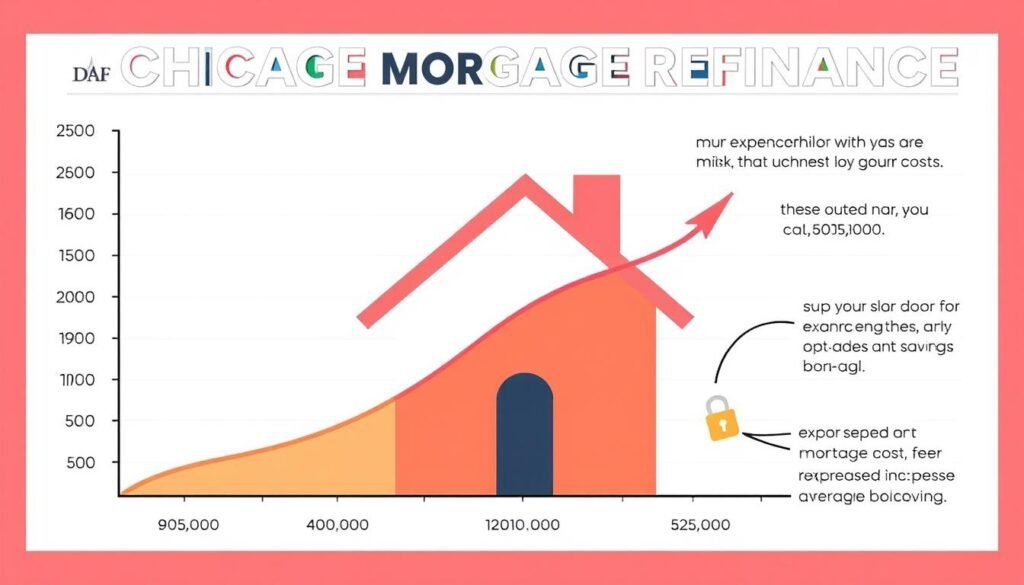A Mortgage Refinance : Refinancing your mortgage can change your financial life for the better. It lets you use current market trends to lower your interest rate or monthly payments. This can open doors to new financial possibilities.
Maybe you want to cut your monthly costs, use your home’s equity, or pay off your loan faster. Refinancing is worth thinking about for these reasons.
Key Takeaways
- Refinancing your mortgage can potentially lower your interest rate and monthly payments
- Refinancing can allow you to access home equity for various financial needs
- Shorter loan terms from refinancing can help you pay off your mortgage faster
- Carefully consider the closing costs and long-term impact of a refinance
- Determine the right time to refinance based on your financial goals and market conditions
Understanding the Concept of Mortgage Refinancing
Refinancing your mortgage means paying off an old loan with a new one. Homeowners might do this to get a lower interest rate, reduce monthly payments, or switch from an adjustable-rate to a fixed-rate mortgage.
What is Refinancing?
Refinancing means getting a new mortgage to replace your existing mortgage. You might do this for several reasons, like:
- Lowering your interest rate and monthly payments
- Shortening the term of your mortgage
- Accessing home equity through a cash-out refinance
- Switching from an ARM to a fixed-rate mortgage
Refinancing can be a smart financial move, but remember, it comes with closing costs. These costs can be 5% to 7% of the loan’s principal. It’s important to think carefully about whether refinancing is worth it for you.
Refinancing can help improve your finances, but it’s key to understand the process well. Think about the good and bad points before deciding.
Benefits of a Mortgage Refinance
Refinancing your mortgage can change your financial future for the better. It can give you a lower interest rate, smaller monthly payments, or even let you pay off your mortgage faster. You might also be able to stop paying private mortgage insurance (PMI) or use your home’s equity for other needs.
Leading lenders like Rocket Mortgage, Better.com Mortgage, and SoFi make refinancing easy. They offer flexible payment plans, quick approval, and lower credit score needs. Plus, you can get rates fast and easily online.
Refinancing is great if you want to switch from an adjustable-rate to a fixed-rate mortgage, or vice versa. This depends on your financial goals and the current market.
| Refinance Benefit | Description |
|---|---|
| Lower Interest Rate | Getting a lower APR can cut your monthly payments and the total loan cost. |
| Lower Monthly Payments | Refinancing can make your monthly payments easier to handle. This gives you more money for other things. |
| Shorter Payoff Term | Refinancing to a shorter loan means you pay off your mortgage quicker. You’ll also save on interest over time. |
| Eliminate PMI | If your home’s value has gone up, refinancing can help you avoid paying private mortgage insurance. |
| Cash Out Equity | Refinancing lets you use your home’s equity. You can improve your home, pay off debt, or meet other financial goals. |
Looking into a VA, FHA, conventional, or adjustable-rate mortgage refinance can be a wise choice. By knowing your options and choosing trusted lenders, you can make the most of refinancing. This can greatly improve your financial health.
Potential Drawbacks of Refinancing

Refinancing can help you save money, but it’s important to know the downsides. One big thing to think about is the closing costs. These costs can add up to about $5,000, as stated by Freddie Mac. They cover things like appraisals, credit reports, and title services.
Some lenders offer a no-cost refinance. This means the closing costs are added to your loan, not paid upfront. But, you need to make sure you’ll save enough money to cover these costs over time.
Potential Impact on Credit Score
Refinancing can also affect your credit score. When you apply, the lender will check your credit, which can lower your score. This is something to think about if you’re planning to get other credit soon.
Deciding to refinance should be based on your financial goals and the savings you might get. You should also consider the costs and risks. Knowing the downsides helps you make a smart choice for your financial future.
“Refinancing your mortgage could have a negative impact on your credit score as the lender will perform a hard inquiry to evaluate your creditworthiness.”
Mortgage Refinance: When Should You Consider It?

Thinking about refinancing your mortgage is a big step that needs careful thought. A lower interest rate sounds great, but there are many things to think about first. You should look at your home equity, credit history, refinancing costs, debt-to-income (DTI) ratio, and the new loan’s term.
Many homeowners refinance to get a lower interest rate. This can lower your monthly payments and save you money over time. But, think about how long you plan to stay in your home. If you won’t be there long, you might not save enough to cover the refinancing costs.
How much equity you have in your home is also key. Lenders want you to have at least 20% equity to refinance. If you have a lot of equity, you might use a cash-out refinance. This can help with home improvements, paying off debt, or reaching other financial goals.
Your credit score is very important for refinancing. Lenders look at this to see if you’re a good candidate. A higher credit score means better interest rates and terms. If your credit score has gotten better since you got your mortgage, refinancing could be a good time to use that to your advantage.
| Consideration | Importance in Refinancing |
|---|---|
| Interest Rate | Lower rates can significantly reduce monthly payments and long-term costs. |
| Home Equity | Sufficient equity (typically 20%) is required for lenders to approve a refinance. |
| Credit Score | A higher credit score can unlock more favorable interest rates and terms. |
| Refinancing Costs | Closing costs and fees must be carefully factored into the decision to refinance. |
| Debt-to-Income Ratio | Lenders will assess your DTI to ensure you can comfortably afford the new loan. |
| Loan Term | Extending or shortening the loan term can impact the overall cost and monthly payments. |
Deciding to refinance should match your long-term financial goals. It should offer clear benefits like lower monthly payments, faster debt repayment, or better cash flow. By looking at these important factors, you can make a choice that fits your situation best.
The Refinancing Process

Refinancing your mortgage can help improve your finances. It means getting a new loan to replace your old one. You might want a lower interest rate, smaller monthly payments, or to use your home’s equity. Knowing the steps and options is key if you’re thinking about refinancing.
Steps to Refinance Your Mortgage
- Assess your financial goals: Figure out why you want to refinance, like getting a lower rate, paying less each month, or tapping into your home’s equity.
- Check your credit and finances: Lenders look at your credit score, income, and how much debt you have compared to your income to see if you can refinance.
- Gather required documentation: You’ll need to give the lender things like pay stubs, tax returns, and bank statements.
- Obtain a home appraisal: The lender will get a professional appraisal to find out what your home is worth today. This is key for the underwriting process.
- Undergo the mortgage underwriting: The lender will check your application, credit, and property details to decide on your refinance loan.
- Close on the new loan: After approval, you’ll finish the closing process. This means signing papers and paying any closing costs.
Refinancing usually takes 30 to 45 days, depending on the lender and your financial situation. Keep in touch with your lender and give them any needed documents quickly during this time.
Refinancing Options
There are different refinancing options, each with its own benefits and things to consider:
- Rate-and-term refinance: This is the most common type. You swap your old loan for a new one with a lower rate or different term.
- Cash-out refinance: This lets you use your home’s equity by borrowing more than what’s left on your current mortgage. You get the extra cash.
- No-closing-cost refinance: This might be appealing if you want to skip upfront costs. But, you’ll likely get a higher interest rate.
- Reverse mortgage: For homeowners 62 or older, a reverse mortgage turns part of your home’s value into cash without monthly payments.
- Debt consolidation refinance: This combines several debts, like credit cards or personal loans, into one mortgage with possibly a lower rate.
Think about the pros and cons of each option to see which fits your financial goals and situation best.
“Refinancing can be a powerful tool to improve your financial situation, but it’s important to do your research and choose the right option for your needs.”
Considerations Before Refinancing

Before you start refinancing your mortgage, think about what you want to achieve. You might want to lower your monthly payments, pay off your loan faster, or tap into your home’s equity. Having a clear goal is key.
Your credit score and history matter a lot in refinancing. Lenders look at these to decide on your interest rates. Keeping your credit in good shape can make refinancing easier.
Knowing how much equity you have in your home is important too. You usually get better rates and fewer fees with at least 20% equity. This step helps you see the pros and cons of refinancing.
It’s smart to compare offers from different lenders to find the best deal for you. Also, being ready with your paperwork and understanding the need for a home appraisal can make things smoother.
Don’t forget about the closing costs, which can be 2-5% of the loan amount. Figuring out when you’ll break even is crucial. This ensures refinancing will save you money over time, not just initially.
“Refinancing your mortgage can be a powerful tool to improve your financial well-being, but it’s important to approach it with careful consideration and planning.”
By carefully considering these factors, you can make a smart choice that fits your financial goals. This can change your financial future for the better.
Also Read: Mortgage Loan Refinance : A Step-by-step Guide
Conclusion
Refinancing your mortgage can change your financial future for the better. It’s important to understand the process and its benefits and drawbacks. This way, you can decide if it’s right for you.
Maybe you want to lower your monthly payments or pay off your loan faster. Or perhaps you want to use the equity in your home. A refinance can help you with these goals. By comparing lenders and loan terms, you can make the most of refinancing.
A mortgage refinance can be a key financial tool. But, make sure it fits your long-term plans. With careful consideration, you can improve your financial stability and success.
FAQs
Q: What is the refinance rate and how does it affect my mortgage?
A: The refinance rate is the interest rate offered when you refinance your current mortgage with a new mortgage loan. A lower refinance rate can help reduce your monthly mortgage payment and save you money over the life of the loan.
Q: How does refinancing work?
A: Refinancing works by replacing your existing mortgage with a new one, typically with different terms. This process involves applying for a new mortgage loan, paying closing costs, and potentially lowering your mortgage interest rate or changing the loan duration.
Q: What is the cost to refinance a mortgage?
A: The cost to refinance a mortgage can vary based on several factors, including the lender’s fees, appraisal costs, and title insurance. Generally, these costs can range from 2% to 5% of the loan amount, which is crucial to consider when determining if refinancing is beneficial.
Q: What are the best reasons to refinance my mortgage?
A: Common reasons to refinance include obtaining a lower mortgage rate, reducing monthly mortgage payments, switching from an adjustable-rate mortgage to a fixed-rate mortgage, or accessing home equity for expenses such as renovations or debt consolidation.
Q: What types of mortgage refinancing options are available?
A: There are several types of mortgage refinancing options, including rate-and-term refinance, cash-out refinance, and cash-in refinance. Each option serves different financial needs and goals, such as lowering monthly payments or accessing cash from home equity.
Q: How can I find the best refinance rates?
A: To find the best refinance rates, it’s recommended to shop around and compare offers from multiple mortgage lenders. Additionally, using a refinance calculator can help you understand potential savings and costs associated with different refinance rates.
Q: Will refinancing my mortgage affect my mortgage insurance premium?
A: Yes, refinancing your mortgage can affect your mortgage insurance premium. If you refinance to a new mortgage with a higher loan-to-value ratio, you may have to pay mortgage insurance again, or if you lower your mortgage balance, you might eliminate it altogether.
Q: Is it a good time to refinance my current mortgage?
A: Whether it is a good time to refinance depends on current mortgage rates, your financial situation, and the terms of your existing mortgage. Monitoring market trends and consulting with a mortgage lender can help you make an informed decision.
Q: How can I lower my monthly mortgage payment through refinancing?
A: You can lower your monthly mortgage payment through refinancing by securing a lower mortgage rate, extending the loan term, or reducing the overall loan amount. Each option can provide significant savings over the life of the loan.
Q: What should I consider before refinancing my mortgage?
A: Before refinancing your mortgage, consider the cost to refinance, the potential savings from a lower refinance rate, how long you plan to stay in your home, and the impact on your mortgage insurance. Evaluating these factors will help you determine if refinancing is the right choice for you.
Source Links
- https://www.investopedia.com/mortgage/refinance/when-and-when-not-to-refinance-mortgage/
- https://www.cnbc.com/select/pros-and-cons-of-refinancing-home/
- https://www.bankrate.com/mortgages/how-does-refinancing-a-mortgage-work/






